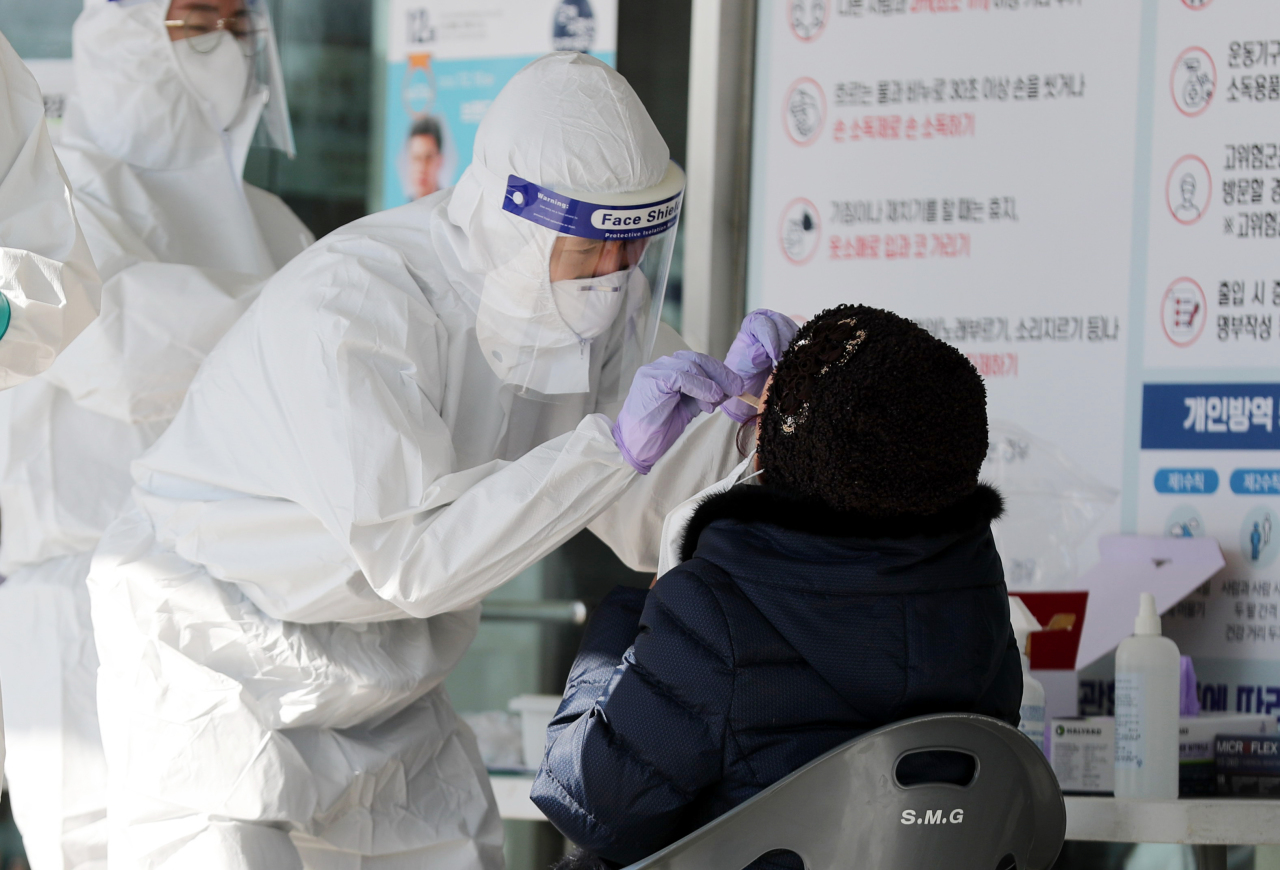Korea marks single-day record for COVID-19 deaths
Only two ICU beds for COVID-19 patients left in Seoul
By Kim ArinPublished : Dec. 15, 2020 - 15:16

The third wave of COVID-19 infections pushed Korea past another grim milestone on Tuesday: 13 people died in the 24 hours ending midnight on Monday, marking the highest daily death toll to date.
Seventy-four people have died of COVID-19 in the first two weeks of December. The total number of deaths is now 600.
Korea on Tuesday confirmed 880 more cases -- 848 locally transmitted and 32 imported -- bringing the cumulative number of official cases to 44,364.
As of Tuesday there were 205 severely or critically ailing patients with COVID-19, up 20 from the day prior. These numbers are feared to rise as people aged 60 or above, who are at greater risk of developing severe complications, make up over 30 percent of cases diagnosed in the last seven days.
Bed shortages continue to plague Korea’s pandemic battle. In the most heavily affected area, Seoul, only two intensive care unit beds for COVID-19 patients were available as of Monday afternoon. Over 84 percent of the city’s COVID-19 beds at hospitals were taken. At the city’s nonhospital treatment centers for patients with a mild case, 302 out of 1,929 beds were available. There were at least 218 patients in Seoul and nearby Incheon and Gyeonggi Province who had been waiting for a bed for more than a day on Monday.
Senior officials at the Ministry of Health and Welfare told reporters in a closed-door briefing Tuesday morning that hospitals will be advised to reduce the length of time patients are kept in ICUs and transfer them to other wards earlier to speed up the turnover of beds.
Last week, the government revised the clinical management guidelines to discharge patients with mild to moderate cases faster. Care is discontinued 10 days after symptoms first appeared if the patient has not exhibited fever without the use of a fever reducer for 24 hours. On average, it takes 21.8 days for mildly or moderately ill patients to fully recover -- as judged by a negative RT-PCR test result -- according to a June study by researchers at Kyungpook National University Hospital.
Seoul is converting shipping containers into COVID-19 wards to ease the shortages, with 48 beds planned to be set up by the end of this month. At-home care for patients who are not considered at risk has been proposed as a possible option in a government briefing last month.
Infectious disease specialist Dr. Lee Jacob said in a Facebook statement Monday: “The government should work with hospitals to brace for the long winter phase of the pandemic. This includes expanding bed capacity and having a regional system of patient transfer ready, for facilitating transportation of patients between hospitals depending on bed occupancy and the patients’ status.”
He said he has been seeing more patients with severe COVID-19 pneumonia at the emergency room of his Gangnam hospital.
“At all costs we must avoid patients dying from a delay in, or worse yet, the absence of care.”
Amid the worsening pandemic, over 2,600 doctors, nurses, nursing assistants and medical students have volunteered for COVID-19 duties by Monday’s count, according to the relevant associations.
In a series of Facebook posts, Dr. Peck Kyong-ran, the chairperson of the Korean Society of Infectious Diseases, called for “fair compensation to hospitals and health care workers that are straining to hold back COVID-19.”
“Everyone who faces hazards deserves hazard pay,” she said. “Even public hospitals are not being fairly compensated for the crushing financial losses posed by the pandemic. But what’s more direly needed than beds are the health care workers who look after the patients. We need better rewards in the form of incentive payments and hazard pay.”
Family physician-turned-lawmaker Rep. Shin Hyun-young said in a statement Tuesday that Korea was lacking in sufficient financial incentives for hospitals and health care workers caring for COVID-19 patients.
“The laws on infectious disease control fail to outline the extent of hazard pay for medical workers, who are at a much higher risk of becoming infected,” she pointed out, adding that she would push for legislation to enhance pay for the front-line workers.
Public health officials are pleading for social distancing of a greater intensity than that being enforced by the degree of restrictions currently in place.
“The only way to turn this crisis around is to eliminate all nonessential contact between people,” Kwon Jun-wook, the Korea Disease Control and Prevention Agency’s deputy director, told a briefing held later the same day.
For younger people under 60, the most commonly identified route of transmission was through gatherings among family and friends, according to KDCA data.
“Cancel all plans, refrain from visiting public places and only go out when it is absolutely necessary,” Kwon said.
Meanwhile, the government said the harshest tier of social distancing restrictions under Korea’s framework would not be put in place “unless worse comes to worst.”
The current tier restricts indoor dining past 9 p.m. and bans gatherings of more than 50 people.
By Kim Arin (arin@heraldcorp.com)


![[Exclusive] Korean military set to ban iPhones over 'security' concerns](http://res.heraldm.com/phpwas/restmb_idxmake.php?idx=644&simg=/content/image/2024/04/23/20240423050599_0.jpg&u=20240423183955)




![[Herald Interview] 'Amid aging population, Korea to invite more young professionals from overseas'](http://res.heraldm.com/phpwas/restmb_idxmake.php?idx=644&simg=/content/image/2024/04/24/20240424050844_0.jpg&u=20240424200058)
![[Pressure points] Leggings in public: Fashion statement or social faux pas?](http://res.heraldm.com/phpwas/restmb_idxmake.php?idx=644&simg=/content/image/2024/04/23/20240423050669_0.jpg&u=)










